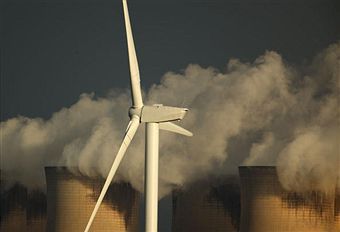 With the latest round of international climate change negotiations at Cancun less than a
week away, Policy Exchange has published research showing that the UK’s and EU’s performance in reducing
carbon emissions is not quite what it seems.
With the latest round of international climate change negotiations at Cancun less than a
week away, Policy Exchange has published research showing that the UK’s and EU’s performance in reducing
carbon emissions is not quite what it seems.
According to the official measure, used to determine performance against the Kyoto agreement, the UK’s emissions have fallen. The UK is set to exceed its Kyoto target of 12.5 percent reduction from 1990 levels. But, in our new report Carbon Omissions, Policy Exchange has estimated that total UK carbon consumption emissions in fact rose by 30 percent between 1990 and 2006.
The reason is that we import and consume a lot more goods made in countries like China than we did in 1990, and the more imported goods we consume, the more carbon emissions there are in China. (And China’s economy has higher carbon intensity than the UK’s.) These emissions are not counted as our emissions under Kyoto, but Policy Exchange accounts for the carbon embedded in these imports, as well as netting off the carbon embedded in our exports. Thus we have developed ‘consumption-based’ carbon emissions estimates 1990-2006, for the UK and a range of other countries. Trumpeting our Kyoto performance is like boasting about being on a Weight Watchers diet, while sneaking extra cream cakes.
Similarly, the official measure of carbon emitted within the EU has fallen since 1990. But the EU’s total carbon consumption had shot up by an estimated 47 percent, by 2006. On this consumption-based measure, the EU’s emissions actually rose faster than the United States’ emissions (at 20 percent), albeit starting from a much lower emissions total.
By 2006, about a third of both the UK’s and EU’s carbon consumption was a result of net imports. On average we each import more than 4 tonnes of carbon dioxide a year, equivalent to around four return flights to New York. In fact, the average EU and US citizen imported more carbon in 2006 than the average Chinese citizen’s total carbon consumption.
We need to reframe understanding of our overall climate impact, which goes well beyond the carbon emissions within our borders. A narrow policy focus on carbon reduction within our own borders misses a third of our impact on the climate.
There must be questions about whether it is right to put such a high proportion of our climate policy spending into expensive measures to reduce domestic emissions. Climate policy needs to focus on developing cost-competitive low carbon technologies likely to have a substantial impact in reducing carbon emissions in China and across the world – increasingly ‘our’ carbon emissions. The Government’s commitment to demonstrate commercial-scale carbon capture and storage is a good example of supporting a technology with potential for major global impact.
Simon Less is Research Director, Environment and Energy, at Policy Exchange.






Comments